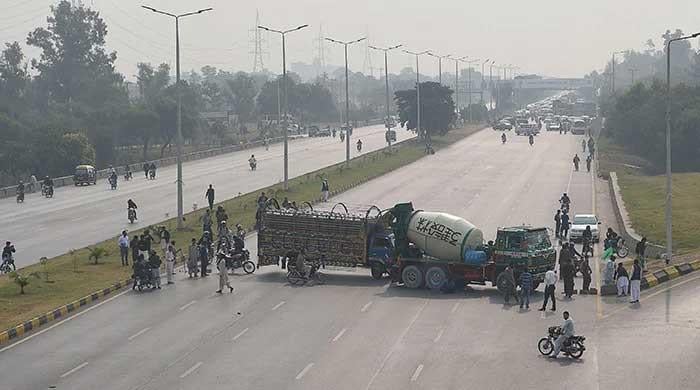Traders, transporters and lawyers observe strike against inflated electricity bills
ISLAMABAD: Major cities across the country witnessed road closures and business shutdowns because of the nationwide strike called by JI to protest against soaring electricity bills. Traffic on the National Highway experienced significant delays.
Dozens of political activists ignited tire fires and blocked major roads in Karachi early on Saturday, causing the city to head towards a shutdown. Concurrently, lawyers in Karachi boycotted the courts.

The Jamaat-e-Islami has called for a nationwide strike today to protest against soaring electricity bills.
In Islamabad, the trader community launched a shutter-down strike against inflation and exorbitant electricity bills. However, a few shops remained open in the Aabpara market.
For the past week, people across the country have been staging demonstrations, demanding a reduction in electricity prices. Nonetheless, the caretaker government has refused, citing a breach of the loan agreement with the IMF if such a move is made.
On Saturday morning, dozens of individuals blocked the National Highway near Quaidabad and Gulshan-e-Hadeed, setting tires on fire and disrupting traffic on the busy highway. Long queues of trucks carrying goods formed at the city’s entry and exit points.
The red People’s Bus Service buses were also not operational.
A similar situation unfolded in other parts of the city. Protesters left burning tires in the middle of the road in the Patel Para area.
Protests and strikes spread to major cities in Sindh
Demonstrators clashed with the police on the National Highway in Karachi, pelting stones at law enforcement agencies, who were compelled to retreat.
In Orangi Town No. 5, protesters blocked traffic, expressing their discontent with hyperinflation and worsening living conditions.
Enraged protesters blocked Dawood Chowrangi in Landhi Town, forcing commuters to navigate through obstructed roads on their way back.
The Karachi Bar Association called for a strike, instructing lawyers not to appear in courts.
Markets and businesses shut down across Hyderabad and Jacobabad cities in Sindh as traders went on a strike against the rise in petroleum product prices and increasing inflation.
In Sukkur, business activities came to a halt as JI and the trader community organized a strike over escalating petrol prices.
Hearing-impaired individuals also joined the protests against inflation, holding placards in Khairpur to denounce hikes in petrol and electricity prices. Business centers in Bandin city were also closed.
Protests and strikes in Punjab
Punjab also witnessed protests, with JI workers demonstrating on Lahore’s Mall Road, voicing their grievances against the previous and caretaker governments.
In Sialkot city of Punjab, traders observed a strike, demanding relief for the common people.
Jehlum’s lawyers’ community boycotted the courts, while traders participated in a shutter-down strike.
In Faisalabad, Jahanian, Raiwind, and Gujranwala, markets closed in response to the nationwide call for protests.
Protests and strikes in Khyber Pakhtunkhwa
Khyber Pakhtunkhwa saw JI workers in Peshawar compelling shop owners to close down their shops on Ashraf Road as they protested against inflation. Some workers even entered the Bus Rapid Transit Peshawar route and tried to halt the buses.
They blocked traffic on GT Road and set tires on fire on the BRT route.
In Landi Kotal of KP, protesters marched toward the Press Club, denouncing the government and demanding relief for the masses.
Citizens in Swabi, KP, took part in the protest, blocking Jahangira road to all traffic while criticizing the interim government and the Water and Power Development Authority for the exorbitant electricity prices.
A day earlier, tailors in Azad Kashmir staged a protest demonstration with their sewing machines, protesting against power companies over rising energy costs and additional taxes on electricity bills.
Caretaker Prime Minister Anwaar ul Haq Kakar stated that while electricity bills are a challenging issue, there is no crisis in Pakistan. He added that the matter is being “magnified” due to political campaigns by all parties.


